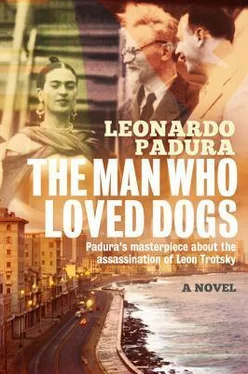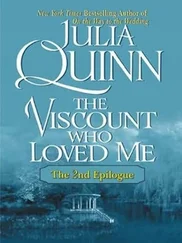“I couldn’t drop my rifle and come running,” he said. “How are you? How’s Luisito?”
“Anxious to see you; that’s why I brought him. I’m fine. Where did that dog come from?”
Ramón smiled and looked at the animal, who was sniffing around the Ford’s wheels.
“He lives with us in the battalion. . He’s really taken to me. He’s handsome, right?” And he bent down. “Churro!” he whispered, and the animal approached him, wagging his tail. Ramón stroked his ears as he picked burrs off of him. He looked up. “Why did you come?”
Caridad looked into his eyes for longer than the young man could bear without averting his gaze, and Ramón stood up.
“They’ve sent me to ask you something. .”
“I can’t believe it. . You’ve come all the way here to ask me a question?” Ramón tried to sound sarcastic.
“Well, yes. The only question that matters: What would you be willing to do to defeat fascism, and for socialism?. . Don’t look at me like that; I’m not kidding. We need to hear you say it.”
Ramón smiled joylessly. Why was she asking him this?
“You’re acting like a recruiting officer. . You and who else need it? Is this a party thing?”
“Answer and then I’ll explain.” Caridad remained serious.
“I don’t know, Caridad. Isn’t that what I’m doing now? Risking my life, working for the party. . Keeping those fascist sons of bitches from entering Madrid.”
“It’s not enough,” she said.
“What do you mean it’s not enough? Don’t make things any harder for me. .”
“Fighting is easy. So is dying. . Thousands of people do it. . Your brother Pablo. . But would you be willing to give up everything? And when I say everything, I mean everything. Any dreams of your own, any scruples, being yourself. .”
“I don’t understand, Caridad,” Ramón said, completely sincere as a sense of alarm grew in his chest. “Are you serious? Can’t you be any clearer? I can’t spend all night here, either,” and he pointed toward the mountain from which he had come.
“I think I’m already speaking very clearly,” she said, and took out another cigarette. At the moment in which she lit the match, the sky was illuminated by the flash of an explosion and the back door of the car opened. Young Luis, covered by a blanket, ran toward Ramón, slipping on the frozen ground, and they held each other in an embrace.
“Wow, Luisito, you’ve become a man.”
Luis sniveled without letting go of his brother.
“And you’re so thin, man. I can feel your bones.”
“It’s the fucking war.”
“And is that your dog? What’s his name?”
“It’s Churro. . He’s not mine, but it’s as if he were. He showed up one day. .” Luis whistled and the animal came to his feet. “He’s a quick learner and he’s so good. . Do you want to take him?” Ramón caressed his younger brother’s messy hair and cleaned his eyes with his thumbs.
Luis looked at his mother, undecided.
“We can’t have dogs now,” she confirmed, smoking avidly. “Sometimes we don’t even have enough to eat ourselves.”
“Churro eats anything, almost nothing,” Ramón said, and instinctively lifted his shoulders to protect himself when a cannon rumbled in the distance. “A whole family could eat with what you spend on tobacco.”
“My cigarettes are not your problem. . Luis, run along with the dog, I need to speak with Ramón,” Caridad ordered, and walked toward an oak tree whose leaves had managed to resist the aggressive winter in the sierra.
Under the tree, Ramón smiled while he watched Luis frolicking with little Churro.
“Are you going to tell me why you came? Who sent you?”
“Kotov. He wants to make you an important proposition,” she said and again fixed him under the green glass of her gaze.
“Kotov is in Barcelona?”
“At the moment. He wants to know if you’re willing to work with him.”
“In the army?”
“No, on more important matters.”
“More important than the war?”
“Much more. This war can be won or it can be lost, but. .”
“What the hell are you saying? We can’t lose, Caridad. With what the Soviets are sending us and the people from the International Brigades, we’re going to fuck those fascists one by one. .”
“That would be great, but tell me. . Do you think we can win a war with the Trotskyists making signals to the fascists in the trenches next to them and with the anarchists taking combat orders to a vote?. . Kotov wants you to work on truly important things.”
“Important like what?”
An explosion shook the mountain, too close to where the three of them were. Instinct pushed Ramón to protect Caridad with his own body and they rolled around on the frozen ground.
“I’m going to go crazy. Don’t those bastards sleep?” he said, on his knees, as he shook the dust off one of the sleeves of Caridad’s cloak.
She stopped his hand and leaned over to pick up the smoking cigarette. Ramón helped her to stand up.
“Kotov thinks you’re a good Communist and that you could be useful in the rear guard.”
“Every day there are more Communists in Spain. Ever since the Soviets and their weapons arrived, the people have a different opinion of us.”
“Don’t believe that, Ramón. People are afraid of us; a lot of them don’t like us. This is a country of imbeciles, hypocritical bigots, and born fascists.”
Ramón watched as his mother exhaled cigarette smoke almost furiously.
“What does Kotov want me for?”
“I’ve already told you: something more important than firing a rifle in a trench full of water and shit.”
“I can’t imagine what he could want from me. . The fascists are moving forward, and if they take Madrid. .” Ramón shook his head, when he felt a slight pressure in his chest. “Shit, Caridad, if I didn’t know you, I would say that you talked to Kotov to get me away from the front. After what happened to Pablo—”
“But you do know me,” she cut him off. “Wars are won in many ways; you should know that. . Ramón, I want to be far away from here before the sun rises. I need an answer.”
Did he know her? Ramón looked at her and asked himself what was left of the refined and worldly woman with whom he, his brothers, and his father used to walk on Sunday afternoons through the Plaza de Cataluña in search of fashionable restaurants or the elegant Italian ice cream shop that had recently opened on the Paseo de Gracia: there was nothing left of that woman, he thought. Caridad was now an androgynous being who reeked of deeply embedded nicotine and sweat, talked like a political commissar, and only thought about the party’s missions, about the party’s politics, about the party’s struggles. Lost in his thoughts, the young man did not notice that, after the mortar explosion that had thrown them to the ground, a heavy silence had settled over the sierra as if the world, overcome by exhaustion and pain, had gone to sleep. Ramón, who had spent so much time submerged in the sounds of war, seemed to have lost the ability to listen to silence, and into his mind, already disturbed by the possibility of a return, floated a memory of the seething Barcelona that he had left a few months earlier, and the tempting image of the young woman who’d given his life a deep sense of meaning.
“Have you seen África? Do you know if she’s still working with the Soviets?” he asked, shamed by the persistence of a hormonal weakness that he could not shake off.
“You’re all talk, Ramón! You’re just as soft as your father,” Caridad said, taking aim at his vulnerable side. Ramón felt that he could hate his mother, but he had to admit she was right: África was an addiction pursuing him.
Читать дальше











